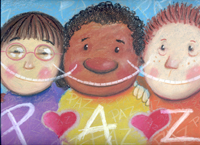

Reinforcing International Collective Activities for 2005
par Isis de PALMA
![]() One of our projects is to make a International Campaigning with artists and their drawings to illustrate the principles of the Charter (see plans for 2005). If these actions become international, we can enlarge the results and it will be incalculable.
One of our projects is to make a International Campaigning with artists and their drawings to illustrate the principles of the Charter (see plans for 2005). If these actions become international, we can enlarge the results and it will be incalculable.
We could also publish these drawings in a wonderful artistic book as Carlos Liberona suggested, even to sell them to obtain resources for the Charter diffusion.
We should discuss among the Committee members the possibilities to do it together.
![]() Being all at so distant points of the world, we should focus on sharing experiences. We believe that Ziad Majed and the group from Lebanon suggestions are fantastic to spread the idea.
Being all at so distant points of the world, we should focus on sharing experiences. We believe that Ziad Majed and the group from Lebanon suggestions are fantastic to spread the idea.
Ziad Majed said “A Campaigning through universities, cultural clubs, media and social movements was proposed as a strategy for Lebanon. Some participants mentioned the importance of making a media spot presenting the charter in 30 seconds with impressive pictures and music in the background and send it to satellite channels to disseminate it”.
We can also do it in Brazil, and if this is done in several countries at the same time, it will then be much easier to attract televisions, media, etc.
Ziad said “The necessity of emphasizing the human interdependence on issues of dignity, freedom and respect. The idea that we are not really free when there are other people under oppression, occupation, and deprived from the basic human rights.
This idea most attracted those who attended the meetings.
They hoped it can be even more elaborated in the charter.
The idea of having a third universal pillar by itself is a very important one. However, it is equally important to have tools and instruments to concretize the pillar and disseminate its values massively worldwide”.
![]() From the work we had done with a student group was writen a report giving opinions and suggestions from the students about the Charter. The summary and some suggestions about the diffusion of the Charter from this group :
From the work we had done with a student group was writen a report giving opinions and suggestions from the students about the Charter. The summary and some suggestions about the diffusion of the Charter from this group :
“The idea of the Charter is fantastic. We could start in the University circles conversations about human responsibilities. We can start discussing the magnitude of the social and environmental crises of our time asking people – Do these problems affect us directly or indirectly ? What do we have to do to share the responsibilities ? What each one can do to change this situation ? We propose to create groups inside the University (in a small village 200.000 mil habitants) to become agents of the Charter principles. To invest money and time before in small groups to discuss and diffuse the Charter. How can we diffuse the Charter with the poor people in the world ?"
Some of these questions we can discussed altogether. How to obtain results ? This is a good question.
![]() Starting from the video we have created in Brazil on the Charter, we could launch a collective debate on how to work together on creating and improving such essential communication tools, trying to focus the work on values and how to change them, especially in education.
Starting from the video we have created in Brazil on the Charter, we could launch a collective debate on how to work together on creating and improving such essential communication tools, trying to focus the work on values and how to change them, especially in education.
We think that most of the actions we decided to start together (when possible) – at the same time – should focus on giving visibility to the Charter and therefore on involving much more journalists (television, newspapers, radio) and much more people.
The global challenge we want to put into a collective debate for action is to reinforce the links with politicians, journalists and entrepreneurs.
The last Annual Meeting of the International Facilitation Committee of the Charter, in Chile, mid January 2005, has been a great opportunity to better exchange on how to enlarge and share activities together while going on with our regional work.


